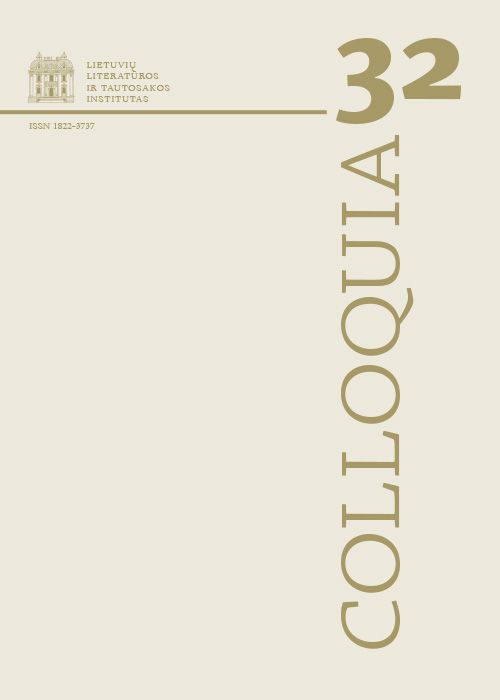The Identity of the Lyric Subject in Marcelijus Martinaitis’ Collection of Poems K.B. Įtariamas
Abstract
The author of this article explores the identity of the lyric subject in Marcelijus Martinaitis’ most recent collection of poems, K.B. Įtariamas (K.B. is Suspect, 2004). The tension between the subject and the contemporary world that characterizes the entire collection can be seen as an extended exploration of the theme of identity that has run through earlier collections by Martinaitis, in which the subject consistently mediates between local archaic culture and modernity. Although, at first glance, the subject of these new poems appears to have adapted successfully to globalization, there remain thresholds at which an ambivalence about this new identity is revealed.
In describing this liminal, threshold state, the author of the article draws on British anthropologist Victor Turner’s theory of structure and its “interstices” and anti-structures (or communitas), which examines rituals of passage from one state to another. Communitas can be understood only through the relationship with an established structure. Similarly, the liminality of Martinaitis’ poetic subject reveals itself through the relationship with a dominant and self-disciplining postmodern reality.
The author concludes that the lyric subject’s partial existence in Turner’s structural interstices can also be explained simply as the artist’s rebelliousness and characteristic sensitivity; at the same time, it can be seen as mediating a different system of meaning – as the memory of self of the “native” of an archaic community. But Martinaitis’ subject is not satisfied to remain in the dominant system’s interstices: he is determined to leave his previous state and to go over to the other side, to live by other rules and the new norms that prevail there. In Martinaitis’ last collection, as in his earlier ones, poetry is relied upon as a rite of passage, the purpose of which is to tame a foreign world – to find harmony between the self, the world, and others. What remains problematic is that this new world is anti-ritual, and no longer believes in interconnection.
Downloads
Most read articles in this journal
- Akvilė Rėklaitytė, The poetry of Atgimimas. Who Called the Nation and Who Led it? , Colloquia: Vol. 47 (2021)
- Akvilė Rėklaitytė, Audronė Barūnaitė-Willeke, „Man literatūra yra ėjimas į mūsų bendrą kultūrą“. Lietuvių išeivijos literatūrologę Audronę Barūnaitę-Willeke kalbina Akvilė Rėklaitytė , Colloquia: Vol. 32 (2014)
- Akvilė Rėklaitytė, Marcelijus Martinaitis’s Cultural “Crafting” , Colloquia: Vol. 36 (2016)
- Akvilė Rėklaitytė, What is the Poet Writing on a Scrap of Paper? , Colloquia: Vol. 41 (2018)
- Akvilė Rėklaitytė, Aesthetic Views of a 20th-century Modernist in a Time Trap , Colloquia: Vol. 53 (2024): Colloquia




